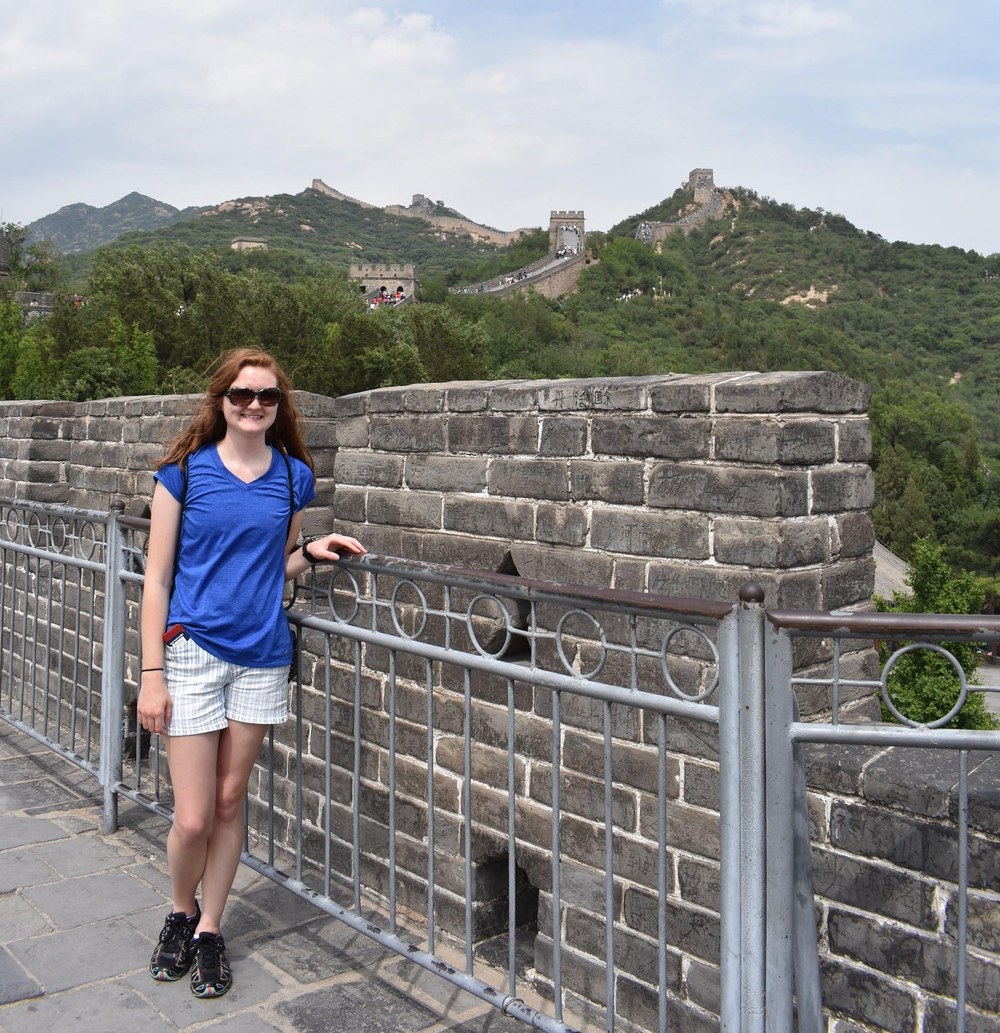Posted: February 7, 2018
By Mary Ann Ostach Majoring in Veterinary and Biomedical Sciences and minoring in International Agriculture and Equine Science. “I couldn't pass up the opportunity to see a new country with a culture so different from my own while gaining research experience in veterinary medicine.”

Sightseeing at the Great Wall of China
Before this trip, the thought of traveling to China never crossed my mind. It wasn't until Dr. Huaguang Lu introduced this internship at the Guangxi Veterinary Research Institute (GVRI) to our class studying avian diseases that I believed it could be possible. I couldn't pass up the opportunity to see a new country with a culture so different from my own while gaining research experience in veterinary medicine. I soon found myself starting this five-week adventure with two other students. Our first stop was Beijing!
Completely disoriented from jet lag and not understanding any Mandarin, we were thankful to have so many kind people show us around. Many of Dr. Lu's friends from veterinary school introduced us to what I now know is authentic Chinese food. After struggling at first, we learned how to properly eat with chopsticks. All the meals were served family style with steaming hot tea. During our short two days in the city, we were able to see the Great Wall of China as well as the Ming Tombs, Tian'anmen Square and the 2008 Olympic Park.
We then traveled to the city of Nanning in the southern part of China. It was here that GVRI was located, and where we would spend the most of our remaining time in China. Each week we worked alongside different members of the laboratory team learning how to perform different animal diagnostics and research techniques. This included completing a chicken necropsy and collecting tissue samples, virus isolation, hemagglutination assay and hemagglutination inhibition tests, as well as RT-PCR. These techniques are crucial to protecting the poultry industry in China, as it is the leading country in poultry production. It was great being able to apply what we learned in the classroom in a laboratory setting. With subtle differences in laboratory procedures, I will be able to use these same techniques at home in protecting our own agricultural industry as I continue my career in the field of veterinary medicine.
During our time at GVRI we were very fortunate to visit a local broiler breeder farm and hatchery. There we learned how they produce 60 million chickens of a local native breed a year. They also process 100,000 chicks a day that are shipped to the northern parts of China as well as Southeast Asian countries such as Laos. It was interesting to see how they adapted to not being able to send the chicks with water on the airplane. Each box of chicks had soybean sprouts packed in as a water supply. It was eye-opening seeing this side of the industry and how it operates in China.
On the weekends we were able to do some sightseeing in the Guangxi province. We explored Guangxi University and Qingxiushan Mountain, both in the city of Nanning. One weekend we ventured to the city of Guilin, a popular tourist site due to its beautiful mountain landscapes. Situated within the mountains is the Li River, which we had a four-hour boat tour to view the scenery. During our last weekend, we visited the coastal city of Beihai where we saw the South China Sea and its abundant pearls. These sites are often overlooked to those who visit China and want to stay in the big cities of Beijing, Shanghai, or Hong Kong, and I am grateful that the members of the GVRI team took us to each of these different places.
In addition to the laboratory skills I gained in animal diagnostics and research from this internship, I also learned how to look at situations from a different perspective. Coming into this internship, I knew very little about Chinese culture, and as a result, I often found myself wondering why their lifestyle was so different. It wasn't until someone explained that it is the eldest who eats first at the dinner table out of respect, or the reason that so many people want to take a picture with us when we were sightseeing was that they seldom saw foreigners, did I understand. I look forward to sharing both these professional and personal skills to future employers and how they will benefit in the workforce when faced with new situations. I am thankful that I was able to take part in this internship opportunity at GVRI and to explore China. I would encourage anyone who was considering studying abroad to go as it is truly a unique experience that you will never forget.
Ag Sciences Global
Address
106 Agricultural Administration BuildingUniversity Park, PA 16802
- Email globalag@psu.edu
- Office 814-863-0249
- Fax 814-865-3055
Ag Sciences Global
Address
106 Agricultural Administration BuildingUniversity Park, PA 16802
- Email globalag@psu.edu
- Office 814-863-0249
- Fax 814-865-3055

